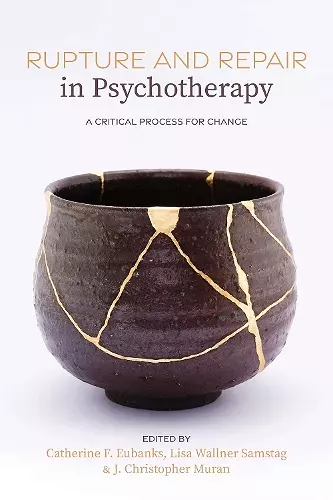Rupture and Repair in Psychotherapy
A Critical Process for Change
J Christopher Muran editor Catherine F Eubanks editor Lisa Wallner Samstag editor
Format:Paperback
Publisher:American Psychological Association
Published:15th Nov '22
Should be back in stock very soon

Ruptures in the therapeutic alliance are common. If left unresolved, they can lead patients to drop out, among other poor outcomes.
Repairing therapeutic ruptures is an important process that is relevant for practitioners of all theoretical orientations.
This volume collects the work of 2 teams of scholars and clinicians, each of whom is expert in a different therapeutic context or theoretical approach, to describe clinical challenges in resolving common therapeutic ruptures.
The authors use case studies to describe realistic, complex clinical examples of rupture and provide strategies and principles therapists can use to help navigate these challenges more successfully with their patients.
As therapists and patients work together their alliance can come under strain, sometimes because of disagreements over therapeutic goals, and sometimes due to a lack of trust and respect. These moments of stress where the relationship has ruptured are challenges, but also opportunities for growth.
We all experience ruptures in our work with clients and need help figuring out how to repair them. The contributors to this well-written book provide evidence-based clinical wisdom to help us all manage these messy, amp ldquo wicked, amp rdquo interpersonal events. Must reading for therapists at all levels of experience.
- Clara E. Hill, PhD, Professor, Department of Psychology, University of Maryland, College Park, College Park, MD, United States All psychotherapists experience alliance ruptures, and we all want more skills to help us repair them. This volume can help. Edited by the leading researchers and thinkers on the topic, it offers accounts of alliance rupture and repair from the point of view of multiple psychotherapy modalities, along with vivid transcripts of clinical examples that bring the material to life.
- Jacqueline B. Persons, PhD, Oakland Cognitive Behavior Therapy Center, Oakland, CA; Department of Psychology, University of California, Berkeley, Berkeley, CA, United States The editors of this book provide a basic lexicon of terms about how to observe complex clinical interactions and react in the present moment. Authors from different schools of therapy use the same language, which allows the editors to highlight common factors in a concluding chapter. The excellent result will be an illuminating experience that will be helpful for clinicians. - Mardi Horowitz, MD, Distinguished Professor of Psychiatry, University of California, San Francisco, San Francisco, CA, United States; author of Understanding Psychotherapy Change Ruptures in the therapeutic alliance are common in all psychotherapies. This book provides informative examples of ruptures and highly detailed methods of rupture repair in many different forms of psychotherapy.
- Arnold Winston, MD, Professor Emeritus, Icahn School of Medicine, Mount Sinai Health System and Chairman Emeritus, Mount Sinai Beth Israel Medical Center, New York, NY, United States; Professor & Associate Chairman, St. George's School of Medicine, Grenada, West Indies A treasure chest of pantheoretical guidance and effective skills on identifying alliance ruptures and repairing them. The editors amp rsquo groundbreaking research has shown practitioners of all theoretical persuasions how to acknowledge ruptures, create a new relational experience, and demonstrably improve psychotherapy outcomes. Not a book-or a method-to be missed! - John C. Norcross, PhD, ABPP, Distinguished Professor & Chair of Psychology, University of Scranton, Scranton, PA, United States; coauthor of Personalizing Psychotherapy; coauthor of Psychotherapy Relationships That Work
ISBN: 9781433836145
Dimensions: unknown
Weight: unknown
338 pages